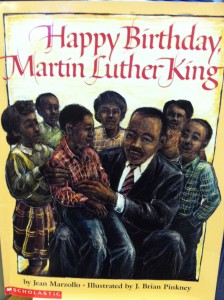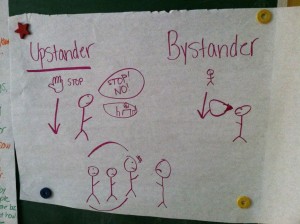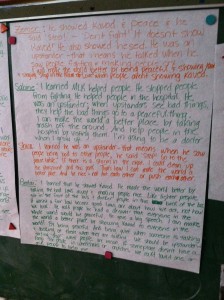Over the last few weeks as we have been preparing to observe Martin Luther King Jr. Day, we learned about Dr. King’s legacy and reflected on our own visions for making the world a better place for all people. Anchoring our discussions and play are the beliefs that all people are made in the image of God (be’zelem Elohim) and that we are responsible for making the world a better place.
During our conversations, we talked about some of the injustices Dr. King experienced in his lifetime (our understandings about the ways in which we are alike and different helped to shape these discussions. Part of our learning is documented on the lobby bulletin board – please check it out!) We learned that Martin Luther King – and the many people who worked with him during the civil rights movement – were upstanders. An upstander is a person who knows what’s happening is wrong and then works to make it right. In comparison, a bystander is someone who witnesses injustice or inequity and doesn’t get involved. The work of civil rights participants and social justice advocates (both then and now) help us to understand the saying (written in Pirkei Avot): “It is not incumbent upon you to finish the task. Yet, you are not free to desist from it.”
Along with Rosa Parks, Rabbi Abraham Joshua Heschel and many, many thousands of men, women and children, MLK worked to change people’s beliefs and attitudes, as well as the laws of the land. During our conversations, we also acknowledged that there is still so much more work to be done and reflected on the ways in which we could build on Dr. King’s legacy of repairing our world (tikkun olom).
Some of us imagined a time when all people will sing “Stop in the Name of Love” when they see something bad and then use the peace table. Other children suggested that we should visit people in the hospital who are sick, pick up trash in playgrounds, and teach people to say our mantra: “I am peaceful.” Still others said they wanted to change unfair laws, build ramps in all buildings for people who use wheelchairs and “teach people to solve a problem in a peaceful way.” Our reflections are posted on our chalkboard in the back of our room; we encourage you to read them in their entirety!
* * * * * * * *
We all agreed that we want, like MLK, a peaceful world in which children and grown-ups alike will remember to use “treat each other with kavod.” We will continue to build upon our discoveries as we reflect on issues of diversity, tolerance and respect throughout our year together. We affirm that our kehillah – community – is built upon the foundation of shared values, goals and concerns. At the same time, we can only continue to grow and learn when we recognize and nurture the differences and diversity among us. We are all unique individuals with differing interests, backgrounds, families, beliefs and personalities. Indeed, our kehillah works every day to reaffirm Dr. King’s words that “darkness cannot drive out darkness; only light can do that. Hate cannot drive out hate; only love can do that.”
* * * * * * * * *
Wishing you a meaningful holiday.
* * * * * * * * *
Below is more of the text from our reflections on what makes us alike and different. See our previous post and the lobby bulletin board for the more illustrations & text):
We are all alike. We like to play in PreK.
We are all different.
Some of us like to pretend to be doctors.
Some of us like to play family of doggie.
Some of us like to play in the block area.
Some of us like to color.
Some of us like to be scientists.
Some of us like to use the Peace Table.
We are all alike. We all have families.
We are all different.
Some of us live with moms.
Some of us live with dads.
Some of us live with moms and dads.
Some people live with two moms.
Some people live with grandparents.


